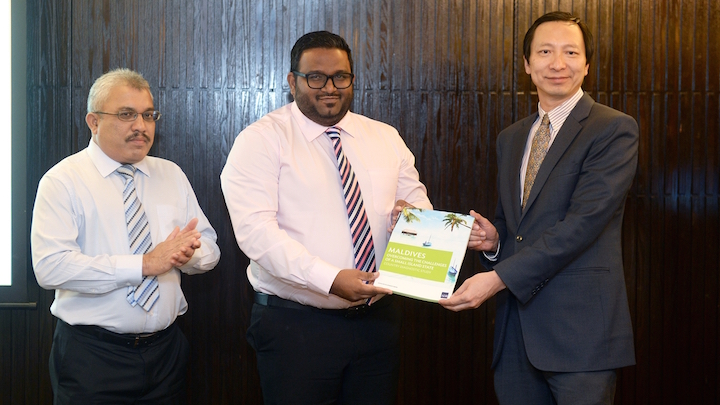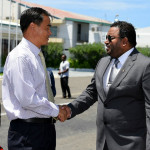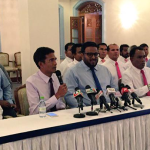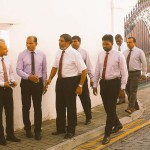The Asian Development Bank (ADB) in a new report has identified institutional and governmental shortcomings as risk factors that “may become constraints in the future” for the Maldivian economy.
A three-year study titled “The Maldives: Overcoming The Challenges of a Small Island State” found that the government’s effectiveness declined after 1996 whilst the ranking for rule of law has fallen since 2005, with the exception of 2012.
Further barriers to economic growth and development include the lack of adequate maritime infrastructure, lack of training and education in the labour force, fiscal mismanagement, persistent deficits, and limitations on access to finance.
Vice President Ahmed Adeeb launched the report at a ceremony held at Hotel Jen this morning. The vice president was accompanied by finance minister Abdulla Jihad, Maldives Monetary Authority (MMA) governor Dr Azeema Adam, senior cabinet members and members of the parliament.
The report also noted perception of corruption has increased, according to the 2013 Global Corruption Barometer, while regulatory quality has worsened in the Maldives since mid-1990s.
Presenting its findings, ADB principal economist Kee-Yung Naim made several policy recommendations, including the development of harbors through public-private partnerships, and improving the quality and access to education and vocational training to address skill shortages in the workforce.
The ADB also called on the government to prioritize spending from the state budget and improve planning and budgeting. To enable economic diversification, the ADB recommended the government enhance access to finance for small businesses.
The bank also recommended several measures to improve governance, including strengthening the Anti-Corruption Commission by providing sufficient funding and ensuring its independence.
The ADB further recommended the development of an anti-corruption strategy and the formulation of adequate and effective anti-corruption legislation while increasing the participation of the civil society in monitoring and implementing government projects “to bring back confidence in the government”.
Other policy recommendations include increasing transparency by timely and adequate disclosure of government transactions, and incorporation of civic education in the national curriculum to enhance values of integrity and honesty.
Following the presentation of the findings, Adeeb asked the ADB’s principal economist to comment on recent constitutional amendments that allow foreigners to own freeholds in the Maldives with an investment of US$1 billion.
However, Kee-Yung Naim did not directly address the controversial amendments, but welcomed free market policies and the government’s efforts to foster a business-friendly environment.
The freeholds amendment has drawn criticism from opposition politicians and civil society organisations. Several youth groups have launched a campaign calling for a public referendum on the issue of selling land.
Speaking at the ceremony, MMA governor Dr Azeema Adam said the Maldives has always been aware of the challenges and constraints noted by the ADB report and criticised the international community for its alleged failure to recognise the budgetary and financial limitations the country faces.
Referring to the government’s flagship Special Economic Zones (SEZ) legislation and the freeholds amendment, Azeema suggested that the changes “are not seen very positively by the international community”.
She described the unprecedented changes as “very creative solutions” required by countries like the Maldives.
In his remarks, finance minister Jihad thanked the ADB for its “continued commitment in providing Maldives with financial and technical assistance” and for the completion of the study despite “many challenges.”


















